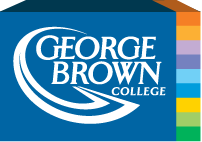About Acting For Media Program in George Brown College
The Acting for Media program goes beyond just acting for film and television and comprises training needed to succeed as a screen actor: acting technique, movement, voice, and script analysis. Students will learn to articulate themselves through screen characterization, on-camera experience, and audition etiquette and standards. Graduating students will have a solid knowledge base of the industry including its history, structure and hierarchy, and professional standards. Workshop simulations, on-camera exercises, voice-over demonstrations, green screen training, and training in motion capture suits provide students with the skills needed to be a successful actor in the field.
Thanks to technological advancements within the film industry, actors are being called upon to characterize in new and interesting ways. Students will be given a basic understanding of the use of such new technology as phonography and immersive environments.
PROGRAM STANDARDS AND LEARNING OUTCOMES
The graduate has reliably demonstrated the ability to:
- Present oneself for employment as a professional actor and provide services that meet professional industry standards and ethics.
- Create a character as intended by the writer through the study of screenplays, storyboards, and commercial copy.
- Develop a believable character appropriate for the role and to the technological requirements of each recorded media discipline.
- Convey and sustain truth of character using relevant technical skills with appropriate emotional depth and clarity throughout the shooting of production.
- Work collaboratively with agents, casting directors, producers, directors and film crews.
- Develop and apply strategies for personal, career and professional development to enhance work performance and maintain currency within the industry.
- Employ improvisational skills for problem solving and character development.
- Prepare materials that showcase his/her skills as both an actor and an entrepreneur.
- Perform the activity required for the character according to the recorded media.
CAREER OPTIONS
Actors move across multiple platforms including film, television, interaction storytelling, motion capture for gaming and animation, and voice-over for narration or dubbing.
Potential job titles include:
- Actor/Actress
- Film Dubber
- Voice-over Actor
- Narrator
- Dramatic Reader
YOUR CAREER
An ever-expanding local film and screen industry creates a consistent demand for fresh faces and new talent in a range of educational, entertainment and commercial activities. Students should be aware, however, that the field is extremely competitive.
Recognized by the Alliance of Canadian Television and Radio Artists (ACTRA), graduates of the Acting for Media program may receive first credit and ACTRA Apprentice member status. Graduates must apply to ACTRA within 60 calendar days of graduation for eligibility.
FUTURE STUDY OPTIONS
For information on future study options, see www.georgebrown.ca/transferguide
Academic qualification equivalents
- Have graduated from senior secondary school or equivalent (those applying for a postgraduate program must have graduated from a university or college)
English language requirements (one of the below):
- IELTS : 6.0, minimum 5.5 in each skill band
- TOEFL : 80 (Internet-based) minimum 20 in each skill band
- PTE : 54, overall minimum 50 in each skill band
George Brown College Highlights
| Type of College |
Public |
| Campus Setting |
Urban |
| Location |
Toronto, Ontario, Canada |
| Number of Campuses |
3 + 3 (location/centers) |
| Type of programs |
Certifications, Diploma, Degree, and Continuing Education |
| Number of full-time students |
32,000 + |
| Number of part-time students |
3,000 + |
| %age of International Students |
17% |
| Official Website |
www.georgebrown.ca |
George Brown College The Average Tuition Fees And Other Expenses
| Student Type |
Tuition Fee |
| Canadian students |
2780 - 15310 USD(two semesters) |
| International Students |
11,320 - 23,900 USD(two semesters) |
Tuition fees for some of the popular programs offered by George Brown College are mentioned below
| Course Name |
Tuition Fee(USD) |
| B.Com |
6,052 |
| B.Tech |
7,272 |
| BSN |
5,430 |
| Wireless Network(Postgraduate) |
4,365 |
| Construction Management(Postgraduate) |
6,183 |
| Marketing Management(Postgraduate) |
4,176 |
Residence Fees
Although rents may vary depending on quality and location, most rents listed by the Housing Service are within the following ranges:
| Accommodation Type |
Rent |
| Shared Accommodation |
500 - 700 USD per month |
| One - Bedroom Apartment |
900 - 1,200 USD per month |
| Two - Bedroom Apartment |
1,100 - 1,500 USD per month |
| Three - Bedroom Apartment |
1,300 - 1,800 USD per month |
Meal Plans
The college provide three types of meal plan options its students, the details of which are mentioned below:
| Plan Name |
Cost |
| Annual Swipe & Save Plan |
1700 USD |
| Semester Swipe & Save Plan |
850 USD |
| Swipe & Save Reloadable Card |
400 USD |
